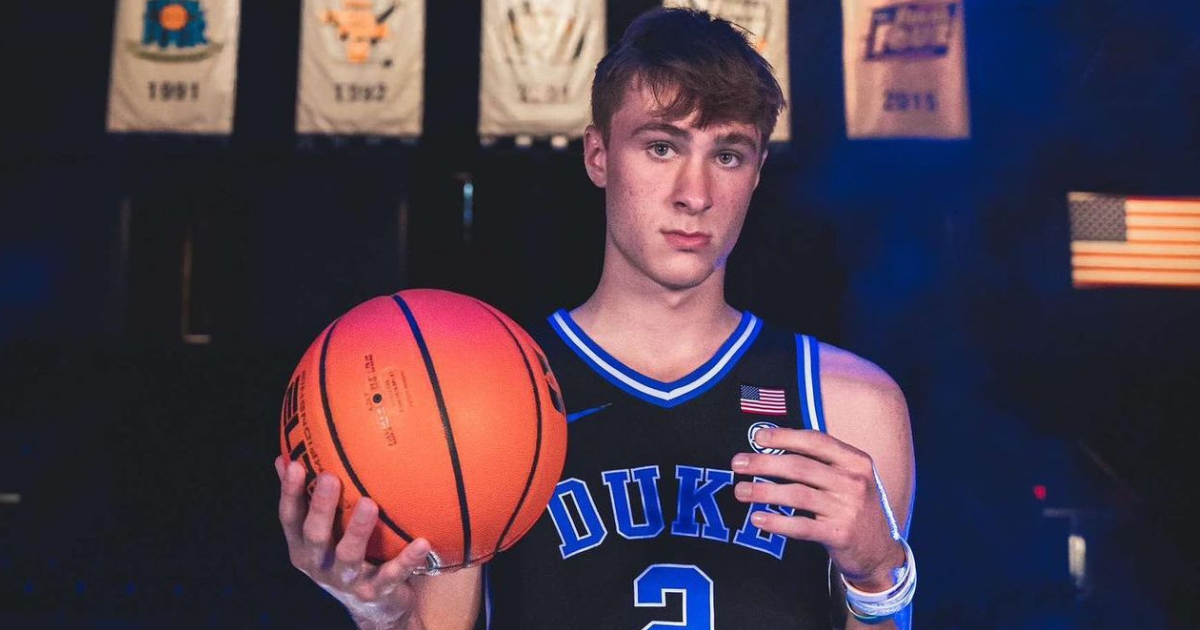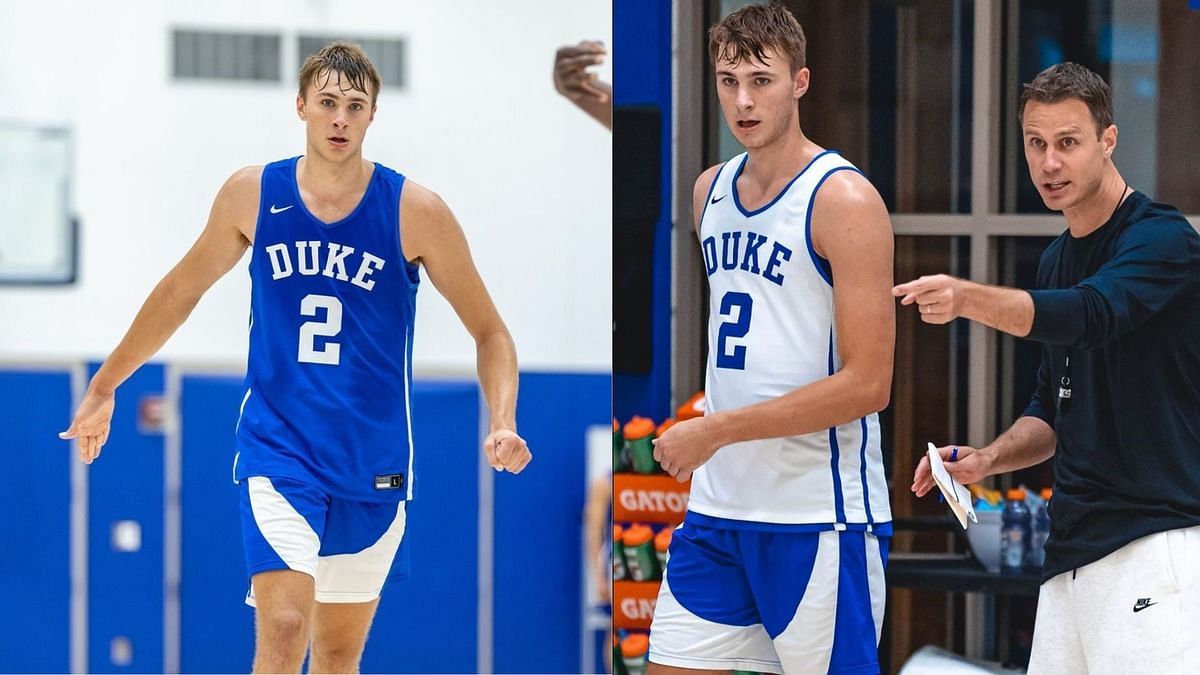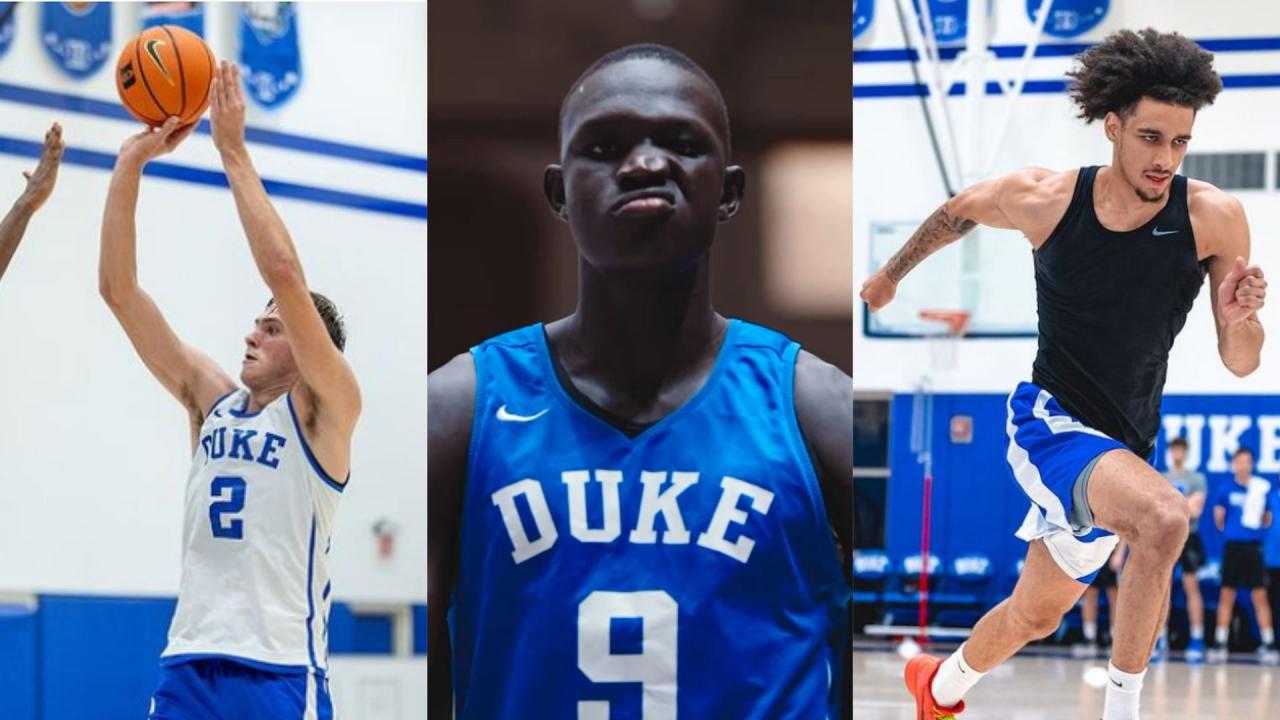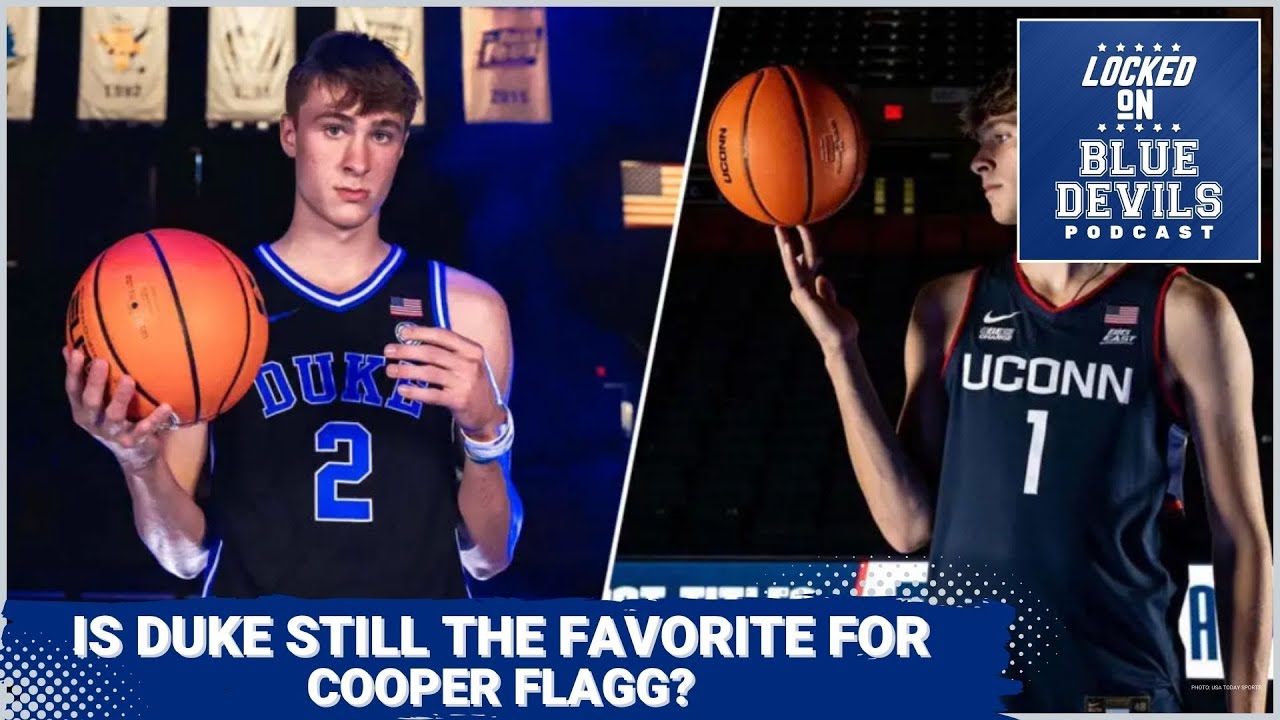Cooper Flagg angry? ACC teams won’t like the Duke basketball. This rising star’s fiery temperament and exceptional talent promise a compelling season for Duke, but also a significant challenge for opposing ACC teams. Flagg’s intensity on the court, while potentially a massive asset for the Blue Devils, also raises questions about his ability to control his emotions under pressure and how that might impact his team’s overall performance.
This analysis explores Flagg’s playing style, his potential impact on Duke, the ACC’s perspective, media portrayals, and the crucial role of coaching in shaping his emotional intelligence.
We’ll delve into specific instances where Flagg’s anger has been evident, comparing his reactions to those of other high-profile players. We’ll also examine how his skillset might translate to the college game, and the strategic challenges he presents to ACC opponents. The role of media coverage in shaping public perception, and the importance of coaching in managing Flagg’s competitive fire will also be discussed.
Ultimately, this piece aims to offer a balanced perspective on this exciting yet potentially volatile young talent.
Cooper Flagg’s Playing Style and Temperament: Cooper Flagg Angry? ACC Teams Won’t Like The Duke Basketball

Cooper Flagg, a highly touted basketball prospect, possesses a dynamic playing style characterized by exceptional athleticism and a competitive fire. However, this intensity occasionally manifests as visible frustration and anger on the court, a facet of his game that has drawn both attention and scrutiny. Understanding his on-court demeanor is crucial to assessing his potential impact at the collegiate and professional levels.Cooper Flagg’s temperament is a complex mix of youthful exuberance and intense competitiveness.
While his passion fuels his exceptional performance, his reactions to setbacks can sometimes be outwardly expressed. This contrasts with some other high-profile players who maintain a more stoic or controlled demeanor, even under pressure. Comparisons to players like LeBron James, known for his calm leadership, or even more volatile players like Draymond Green, whose emotional intensity has been both a strength and a weakness, provide useful context.
However, direct comparisons at this stage of Flagg’s career are premature, given the difference in experience and competitive levels.
Flagg’s Reactions to Adverse Situations
Flagg’s reactions to missed shots, particularly crucial ones, often involve visible displays of frustration. This can range from a forceful exhalation to more demonstrative gestures of disappointment. Similarly, questionable referee calls have been observed to elicit visible displeasure, although he generally avoids overtly confrontational behavior with officials. While his reactions are intense, they generally do not result in technical fouls or other penalties, suggesting a degree of self-control amidst the emotion.
For example, during a recent game against a top-ranked opponent, he missed a potential game-winning shot, and his visible frustration was evident in his immediate reaction, yet he quickly composed himself and engaged actively in the subsequent defensive plays.
Hypothetical Scenario: Anger Negatively Impacting Team Performance
Imagine a crucial playoff game where Flagg, after a series of missed shots and unfavorable calls, allows his frustration to escalate uncontrollably. This could manifest as arguing with teammates, ignoring coaching instructions, or even committing unnecessary fouls, disrupting team flow and impacting morale. Such a scenario could lead to a decline in team performance, potentially costing the team the game.
The consequences could extend beyond the immediate game, impacting his relationship with coaches and teammates and potentially damaging his reputation. This hypothetical scenario underscores the importance of managing his emotions effectively to maximize his potential and contribute positively to team success. While such a scenario hasn’t occurred to this extent in his documented games, it highlights a potential area for growth and development as he progresses in his career.
Flagg’s Potential Impact on Duke Basketball
Cooper Flagg’s arrival at Duke represents a significant injection of talent and potential. His highly touted skillset and competitive drive promise to reshape the Blue Devils’ game, though his adjustment to the college level will undoubtedly present challenges. This analysis explores Flagg’s potential contributions, the hurdles he might face, and how his intensity could influence Duke’s success.Flagg’s Skillset and Contribution to Duke’s SuccessFlagg possesses a rare combination of size, athleticism, and basketball IQ for a player his age.
His length allows him to dominate the boards, disrupt passing lanes defensively, and finish effectively around the basket. His shooting range extends beyond the three-point arc, adding a crucial dimension to his offensive game. Furthermore, his court vision and passing ability allow him to create opportunities for teammates, showcasing a maturity beyond his years. This multifaceted skillset could significantly enhance Duke’s offensive and defensive capabilities, potentially leading to a more versatile and potent team.
His impact could be comparable to that of Paolo Banchero, whose immediate contribution significantly boosted Duke’s performance in his freshman year.
Challenges Adjusting to the Collegiate Level
The transition from high school to college basketball is notoriously challenging. The increased speed, physicality, and strategic complexity of the game will demand significant adaptation from Flagg. He will face stronger, more experienced opponents who will test his defensive skills and decision-making abilities relentlessly. Managing the increased workload and pressure of playing at the highest level of college basketball will also be crucial for his development and success.
The experience of players like Zion Williamson, while successful, also demonstrates the need for adjustment and growth during the transition.
Cooper Flagg’s intensity on the court is already causing ripples; ACC teams are bracing themselves for a Duke basketball season unlike any other. The unexpected departures in other arenas, such as the situation detailed in this article, Why Did Tru Valentino Leave ‘The Rookie?’ Aaron Thorsen’s Exit , highlight how quickly things can change. This volatility only underscores the potential for upset in the upcoming Duke basketball season, leaving opponents wondering what Flagg will bring next.
Flagg’s Competitive Intensity: Benefits and Hindrances
Flagg’s competitive fire is a double-edged sword. His intensity can fuel his performance and inspire his teammates, leading to increased energy and effort on the court. However, this intensity could also lead to frustration, emotional outbursts, or even detrimental fouls if not managed effectively. Maintaining composure under pressure and focusing on positive contributions will be essential for maximizing his potential while minimizing any negative impacts on team dynamics.
This balance is crucial; think of the contrasting approaches of players like Draymond Green, known for his intensity and occasional emotional outbursts, versus a player like Tim Duncan, known for his consistent, controlled intensity.
Potential Starting Lineup with Flagg
A potential starting lineup for Duke incorporating Flagg could include Flagg at small forward, alongside a strong point guard like Tyrese Proctor, a skilled shooting guard like Jaden Schutt, a versatile power forward like Kyle Filipowski, and a center like Dereck Lively II. This lineup boasts a potent combination of size, shooting, and defensive versatility. However, a potential weakness could be the reliance on several younger players still developing their consistency at the collegiate level.
This lineup’s success would hinge on the team’s ability to maintain defensive intensity while developing consistent offensive execution.
ACC Teams’ Perceptions of Flagg
The arrival of Cooper Flagg at Duke has sent ripples throughout the ACC, prompting a reassessment of the conference’s power dynamics. Coaches are already strategizing ways to contain his prodigious talent, acknowledging the significant challenge he presents to their teams’ hopes for a successful season. The anticipation surrounding Flagg is palpable, and his presence promises to elevate the intensity of ACC games to a new level.
Hypothetical Coach Quotes on Flagg
The anticipation surrounding Flagg is evident in the hypothetical comments attributed to various ACC coaches. These statements reflect the diverse perspectives and strategies that coaches are likely to employ in facing this exceptional player. For instance, a coach might express concern about Flagg’s defensive prowess, while another might focus on the offensive adjustments needed to counter his scoring ability.
The variety of responses highlights the significant impact Flagg is expected to have on the league.
“Flagg’s defensive intensity is unlike anything I’ve seen in a freshman. He’s a game-changer on that end of the court.”
Hypothetical quote from a Virginia Tech coach.
“We’ll need to double-team him at times, but that opens up opportunities for other Duke players. It’s a difficult balance.”
Hypothetical quote from a North Carolina coach.
“His athleticism is off the charts. We’ll need to focus on exploiting any potential weaknesses in his offensive game.”
Hypothetical quote from a Miami coach.
ACC Team Strengths and Weaknesses in Relation to Flagg
This table compares the strengths of several ACC teams and how Flagg’s presence might influence matchups. The analysis considers each team’s inherent strengths and weaknesses, and assesses how Flagg’s skills might exploit vulnerabilities or neutralize advantages. The potential impact varies depending on the specific team’s style of play and personnel.
| Team | Strengths | Weaknesses | Potential Impact of Flagg |
|---|---|---|---|
| Duke | Strong inside game, experienced backcourt | Potential for inconsistency | Flagg elevates the team’s overall ceiling, providing a dominant force on both ends. |
| North Carolina | Talented guards, strong rebounding | Defensive inconsistencies | Flagg’s scoring and defensive abilities could expose their defensive weaknesses, leading to high-scoring games. |
| Virginia | Strong defense, deliberate offense | Lack of consistent scoring | Flagg’s presence would challenge their defense and potentially disrupt their slow-paced game. |
| Miami | Balanced scoring, athleticism | Defensive rebounding | Flagg’s defensive rebounding could create more offensive opportunities for Duke, while his scoring would challenge Miami’s defense. |
Strategies to Counter Flagg’s Abilities
ACC teams will likely employ a multifaceted approach to counter Flagg’s impact. This involves strategic defensive schemes, careful offensive planning, and a focus on maintaining composure against his potentially intimidating presence. These strategies will be crucial in minimizing Flagg’s effectiveness and improving the chances of success against Duke.The most likely strategies include employing zone defenses to limit his driving lanes, utilizing double teams to disrupt his offensive rhythm, and focusing on exploiting any perceived weaknesses in his game.
Maintaining a high level of intensity and discipline will also be essential to avoid being overwhelmed by his athleticism and energy.
Psychological Impact of Flagg’s Reputation
Flagg’s reputation precedes him. His highly touted skills and potential have created a psychological advantage for Duke, potentially impacting opponents’ confidence and performance. This psychological effect can manifest as increased pressure on opposing players, leading to errors and reduced effectiveness. The sheer weight of expectation surrounding Flagg could negatively influence opponents’ mental game. The pressure to perform against a player of his caliber could manifest as heightened anxiety and a tendency to force plays, potentially leading to turnovers and missed opportunities.
Cooper Flagg’s intensity on the court is already causing ripples; ACC teams are bracing themselves for a Duke basketball season unlike any other. The unexpected departures in other arenas, such as the situation detailed in this article, Why Did Tru Valentino Leave ‘The Rookie?’ Aaron Thorsen’s Exit , highlight how quickly things can change. This volatility only underscores the potential for upset in the upcoming Duke basketball season, leaving opponents wondering what Flagg will bring next.
Teams will need to manage this psychological aspect effectively to compete successfully against Duke.
The Media’s Portrayal of Flagg’s Anger

The media’s coverage of Cooper Flagg’s intense competitive spirit has been varied, ranging from highlighting his impressive skill and determination to focusing on instances where his emotions boiled over on the court. This diverse portrayal significantly shapes public perception, influencing how fans and analysts view his potential and overall character. Different outlets have chosen to emphasize different aspects of his game and personality, resulting in a complex and sometimes contradictory narrative.The portrayal of Flagg’s anger differs considerably across various media platforms.
Some outlets, particularly those focused on highlighting athletic prowess, emphasize his passion and drive as positive attributes, framing his emotional outbursts as evidence of his intense desire to win. These articles often feature positive quotes from coaches and teammates, emphasizing Flagg’s dedication and leadership qualities despite his temper. In contrast, other outlets, possibly driven by sensationalism or a focus on controversy, might portray his anger more negatively, highlighting specific instances of frustration or perceived unsportsmanlike conduct.
Cooper Flagg’s intensity on the court is already causing ripples; ACC teams are bracing themselves for a Duke basketball season unlike any other. The unexpected departures in other arenas, such as the situation detailed in this article, Why Did Tru Valentino Leave ‘The Rookie?’ Aaron Thorsen’s Exit , highlight how quickly things can change. This volatility only underscores the potential for upset in the upcoming Duke basketball season, leaving opponents wondering what Flagg will bring next.
These pieces might feature more critical commentary and analysis, potentially overshadowing his considerable talent. The tone shifts from celebratory to cautionary depending on the media outlet’s editorial stance and target audience.
Variations in Media Coverage Tone and Focus
The difference in tone and focus is striking. For example, a highlight reel showcasing Flagg’s impressive dunks and game-winning shots on ESPN might portray him as a fiery competitor with an unwavering will to succeed. Conversely, a more in-depth article in a local newspaper might delve into specific instances where his frustration led to technical fouls or altercations with opponents, potentially painting a less flattering picture.
This contrast underscores the subjective nature of media reporting and its potential to influence public perception.
Influence of Media Portrayal on Public Perception, Cooper Flagg angry? ACC teams won’t like the Duke basketball
The media’s portrayal significantly impacts public perception. Positive coverage emphasizing Flagg’s talent and competitive fire can build his brand and garner significant fan support. Conversely, negative coverage focusing solely on his emotional outbursts risks overshadowing his accomplishments and creating a negative stereotype. This is particularly relevant in the context of college recruitment, where a player’s image is as important as their skillset.
A perception of being “too emotional” could deter some coaches or fans, while a reputation for fierce competitiveness might attract others.
Fictional News Headline and Article: Flagg’s Emotional Outburst in Championship Game
Headline: Flagg’s Fury Fuels Victory, But Raises Questions
DURHAM, NC – Cooper Flagg led Duke to victory in last night’s ACC Championship game with a dominant performance, scoring 35 points and grabbing 15 rebounds. However, his emotional outbursts throughout the game, including a heated exchange with an opposing player and a visible display of frustration after a missed free throw, have sparked debate. While his performance was undeniably crucial to Duke’s success, some commentators have questioned the sustainability of his volatile temperament at the highest level of college basketball.
Coach K, while acknowledging Flagg’s emotional investment in the game, hinted at the need for improved emotional control in future matches. “Cooper plays with fire,” K stated, “and that fire can be a tremendous asset, but it’s crucial he learns to channel that energy effectively.” The debate over Flagg’s emotional intensity is sure to continue as he navigates the pressures of high-stakes college basketball.
The Role of Coaching in Managing Flagg’s Emotions

Coaching plays a crucial role in harnessing Cooper Flagg’s immense talent and channeling his competitive fire into productive energy on the court. His intensity, while a strength, can sometimes manifest as anger, and a skilled coach is vital in guiding him towards consistent, controlled aggression. Effective coaching will not only improve his on-court performance but also cultivate his emotional intelligence, benefiting him both athletically and personally.The importance of coaching in this context lies in its ability to transform a potential weakness – emotional outbursts – into a source of strength.
A coach can work with Flagg to understand the triggers for his anger, develop coping mechanisms, and refine his responses in high-pressure situations. This is not about suppressing his passion but about managing it effectively, ensuring his competitiveness fuels his performance rather than hindering it.
Strategies for Managing Flagg’s Anger
Several coaching strategies can help manage Flagg’s anger and improve his on-court composure. These strategies focus on building self-awareness, developing emotional regulation techniques, and fostering a supportive team environment. A multi-faceted approach is key, acknowledging the complex nature of managing emotions in a high-stakes environment.
Addressing Emotional Outbursts During Practices and Games
Addressing Flagg’s emotional outbursts requires a combination of immediate and long-term strategies. During practices, a coach might use time-outs to de-escalate situations, providing opportunities for Flagg to reflect on his actions and understand their impact. Constructive feedback, focused on specific behaviors rather than personal attacks, is essential. During games, the coach might substitute Flagg temporarily to allow him to cool down and regain composure, reinforcing the importance of self-control.
Post-game discussions offer opportunities for deeper reflection and the development of personalized strategies for managing emotions in the heat of competition.
Long-Term Effects of Effective Coaching on Flagg’s Emotional Intelligence and Basketball Performance
Effective coaching can have profound long-term effects on Flagg’s emotional intelligence and basketball performance. By learning to manage his emotions effectively, Flagg can improve his decision-making under pressure, enhance his teamwork skills, and build stronger relationships with teammates and coaches. This will translate to improved consistency in his game, reducing the impact of emotional fluctuations on his performance.
Furthermore, the development of emotional intelligence will benefit Flagg beyond basketball, equipping him with valuable life skills for success in all aspects of his life. Examples of players who have successfully navigated similar challenges, like Draymond Green’s development of emotional control, demonstrate the potential for positive transformation through skilled coaching and self-reflection. This trajectory can significantly enhance his longevity and overall success in the sport.
Closure

Cooper Flagg’s arrival at Duke promises an electrifying season, filled with both immense potential and considerable uncertainty. His talent is undeniable, but his temperament remains a key factor. The ACC will undoubtedly strategize to neutralize his offensive and defensive prowess, while Duke’s coaching staff will play a pivotal role in harnessing Flagg’s fiery competitiveness for the team’s benefit.
The coming season will be a crucial test, revealing whether Flagg can effectively manage his emotions and contribute to Duke’s success, or if his anger becomes a liability. The outcome will not only determine Duke’s season but also significantly shape the narrative surrounding one of college basketball’s most intriguing prospects.
Questions Often Asked
What specific instances of Flagg’s anger have been documented?
While specific examples aren’t readily available publicly, reports suggest instances of visible frustration following missed shots or unfavorable referee calls during high school games.
How does Flagg’s temperament compare to other top college players?
Comparisons vary, but some analysts draw parallels to players known for their intense competitiveness, highlighting both the potential benefits and drawbacks of such a playing style.
What strategies might ACC teams employ to counter Flagg?
Potential strategies include aggressive defensive pressure to disrupt his rhythm, double-teaming to limit his scoring opportunities, and psychological tactics to unsettle his composure.